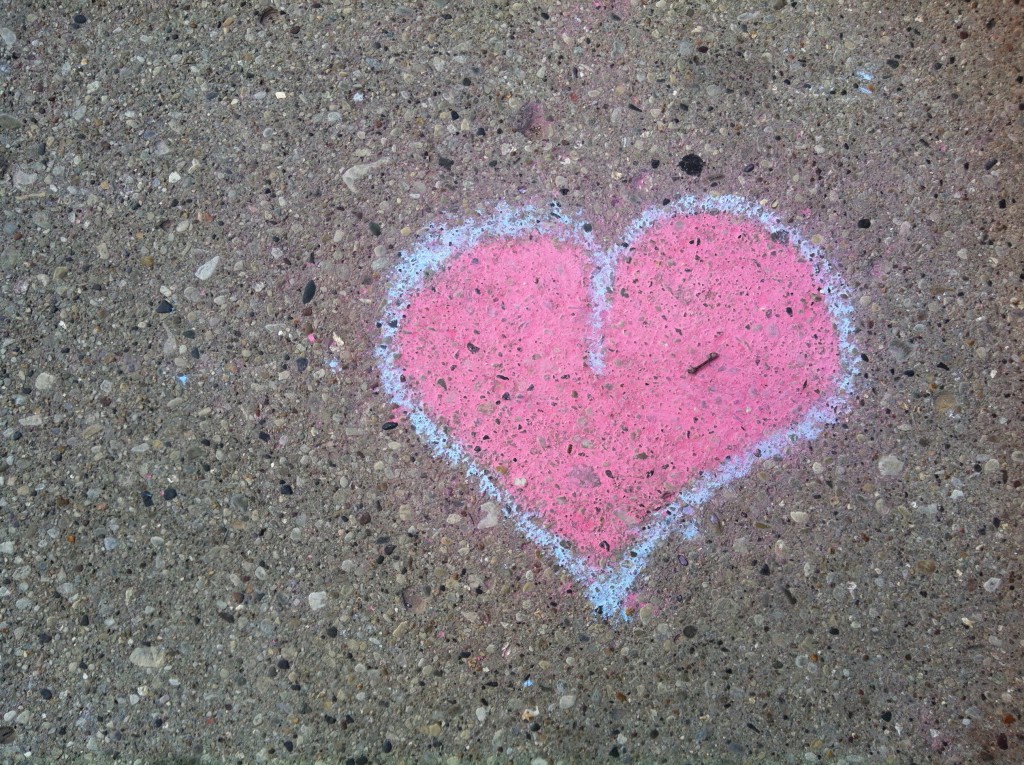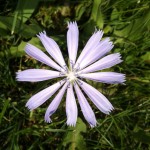
I moved to Milwaukee in April 1997. That October, Breast Cancer Awareness Month, my mother was diagnosed with advanced stage breast cancer.
A few weeks after my mother’s diagnosis, her mother—my grandmother—died of a heart attack as she stood at her bathroom mirror in Pittsburgh. She had been beyond worried.
Mom’s doctor wanted her to start treatment right away, but that all had to be put on hold until after the funeral of one of the most beautiful women I have ever known. When it was over my mother gave me the long strip of pink (my grandmother’s favorite color) tulle with “GRANDMOTHER” in gold letters that had been stretched across the back of her coffin. I rolled it up and put it in the top drawer of the dry sink my grandfather built for me.
My mother and I stayed with my grandfather for a few days, cooking and freezing meals for him, doing some housecleaning, and just sitting around the kitchen table talking. At my grandfather’s insistence we also started going through my grandmother’s things and packing them up.
“You’re such a trooper,” my mother said to me.
We drove back to Cleveland, leaving my grandfather to face his grief alone. I returned to Milwaukee the next day, and my mother started chemotherapy and radiation to try to shrink the tumor in her left breast. After her initial treatment ended, her doctor scheduled surgery to remove the breast.
The week of my mother’s surgery, I couldn’t sleep at all. I kept wondering what was going through her mind, how she felt as she lay in her bed, as she looked at her body in the mirror, knowing that what was there today would not be there tomorrow. Nothing would be the same again.
Soon after her surgery, I went in for my yearly mammogram and got a phone call first thing the next morning. “We need you to come in,” said the nurse. “We found something.”
They showed me the film and the anomaly: a fluid-filled sac the size of a small olive, with weird little chambers. “I’ll recommend a good surgeon who can aspirate it,” said the radiologist, and just as I started to feel relief he added, “and then we’ll do a biopsy.”
I don’t remember why I was outside when I called my mother about something so private, but I do remember sitting on the curb looking into my car tire as we talked. My mother, who had a history of not always saying the kindest things, especially when things weren’t going well for her, was calm and strong and wonderfully sweet – an earth mother. The way I’d always yearned for her to be.
“You’re going to be fine, honey,” she said. “Don’t worry.”
A few weeks after my mother’s breast was removed, I was on my back on a table while the surgeon stuck a needle into my right breast. He didn’t use an anesthetic, and he was digging around trying to find the fluid filled sac. All I could think of was my mother.
“Stop,” I finally said, my face soaked with tears. The surgeon said I could reschedule at the front desk. I walked out and never went back.
My doctor scheduled me with a different surgeon, who gave me plenty of local anesthetic, found the offending mass quickly, and aspirated it on the first try. The empty sac was absorbed by my lymph system and never showed up on another mammogram.
On my next trip to Cleveland, I was walking past the bathroom in my parents’ house when my mother called me in. ”Close the door,” she said.
I turned to her.
“Do you want to see my scar?” she asked. And before I could say yes or no or anything else, she hiked up her shirt. Where her left breast used to be was a smooth red scar, curved like a quarter moon.
“I’m impressed,” I said, and bent toward it a little more. “Really impressed.” It was the mark of someone with great respect for his patients, and for women.
She looked into my eyes. “Do I look okay?”
Of course she did. She was perfect.
Five years later, my mother was pronounced in remission from breast cancer. During a period of time when I was finishing graduate school and she and I weren’t talking, a mammogram turned up something suspect, in my left breast this time: a strange little isthmus that I could barely see on the film but that had the radiologist up in arms. It had to come out. My husband came to the appointment with me and good-naturedly chatted with the doctor and nurse as my left breast was numbed, a cut was made, and a tube stuck in, followed by a surgical device that obliterated the isthmus.
The doctor inserted a tiny lead ball to mark the spot in case the biopsy came back positive, and gave me a cloth ice pack to stick in my bra. Nothing has ever felt as good as that ice pack. The isthmus turned out to be benign. Today when I get my mammograms, that little lead ball shows up on the film as bright as the North Star.
My mother remained in remission from the breast cancer, but developed a number of other health problems, including a cancer unrelated to the breast cancer. It metastasized to her hip and lung; it was the lung cancer, she was fond of saying to me, that was the nail in her coffin.
She died four years ago this month, just three days after her 75th birthday. If she were alive today she’d be 79 on October 30th, the second-to-last day of Breast Cancer Awareness Month 2015. On her birthday I will be in Cleveland celebrating her memory with my father, brothers, and other family members and friends. I may get there too late to join them all at the mausoleum, but will be there in time for the dinner. I’ll go to the mausoleum the next day.


Love love this…please drop over then…………was missing my swing buddy…when I was outside she often found me for a chat..
I love you Robin. Thank you for being the voice and the spirit you are and bless your mother’s soul for being the woman she was here while it was her time. Celebrate such a beautiful spirit as it is obvious it has spread to so many. <3
Thank you, Robin, for this sensitive and honest piece. You use your gift wisely, educating the masses.